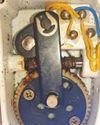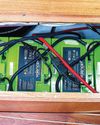Intentar ORO - Gratis
Caring for anodes
Practical Boat Owner
|Summer 2025
Tips from the experts at boatcare for checking and replacing anodes

When it comes to keeping your boat shipshape, an often-overlooked yet critical maintenance task is checking and replacing sacrificial anodes. These small and relatively inexpensive items act as a protective barrier against galvanic corrosion, saving your engine, propeller, and other underwater metallic parts from costly damage. We use the term 'relatively' because in some cases they're actually quite expensive, but not when compared with the kit they are protecting. Here we'll explain why anodes matter, how to check them, and the step-by-step process for replacing them.
What are anodes and why are they important?
Anodes are made from metals such as zinc, aluminium, or magnesium, and are designed to sacrificially corrode instead of your boat's more valuable metal components. This could include anything from bronze fittings such as propellers and stern gear, through-hull valves, rudders, and trim tabs -all of which are either high-value items or integral to the watertightness of your hull. The process by which these anodes work is called cathodic protection, and it works because when two dissimilar metals that are electrically bonded to each other are immersed in an electrolytic fluid, such as seawater, the more reactive of these metals will corrode first.
This is especially important when you consider an item such as a saildrive, which could be made of an aluminium casing, steel shafts, bearings, and gear sets, all of which are made from different grades of different metals.
A new saildrive is certainly not a cheap bit of kit, so it's definitely a good idea to keep it well protected!
Different anode types and materials
Esta historia es de la edición Summer 2025 de Practical Boat Owner.
Suscríbete a Magzter GOLD para acceder a miles de historias premium seleccionadas y a más de 9000 revistas y periódicos.
¿Ya eres suscriptor? Iniciar sesión
MÁS HISTORIAS DE Practical Boat Owner

Practical Boat Owner
An adventure to St Kilda
Marsali Taylor swaps skippering her Offshore 8m for being crew on a converted herring drifter, with comfy berths in the former fish hold
8 mins
January 2026

Practical Boat Owner
Mast refit and upgrade
Nicholas Koligiannis explains how he improved the mast on his Albin Ballad
5 mins
January 2026

Practical Boat Owner
Making more noise in fog
Nick Tyler takes the guesswork out of broadcasting fog signals
3 mins
January 2026

Practical Boat Owner
Solo across the Pacific
Triple amputee Craig Wood sailed into the history books with a non-stop, 90-day, 7,506-mile unassisted voyage
8 mins
January 2026
Practical Boat Owner
Al-assisted Shipping Forecasts
The Met Office has released new data showing a decade of steady improvement in the UK Shipping Forecast, with wind speed and sea state accuracy up by 10% or more.
1 min
January 2026

Practical Boat Owner
Bligh-ted reputation
Making the case for the mutiny on the Bounty's much maligned Captain Bligh
3 mins
January 2026

Practical Boat Owner
Wiper motor repair
Richard Stone mends his deck saloon windscreen wipers
2 mins
January 2026

Practical Boat Owner
'Let someone know boat plans' says report into fatal man overboard incident
The importance of designating a shore contact before setting off on a boat trip has been highlighted following a fatal man overboard incident near Inishbofin, Co. Galway, Ireland.
1 mins
January 2026

Practical Boat Owner
LITHIUM BATTERIES latest safety advice
Marine engineer and surveyor Marcus Jones unpicks the confusion surrounding the use of lithium batteries and what you should consider if installing them on board your boat
8 mins
January 2026

Practical Boat Owner
How to winterise your motor boat
Jon Mendez explains the steps you need to take to ensure your boat stays in top condition for next season
4 mins
January 2026
Listen
Translate
Change font size
